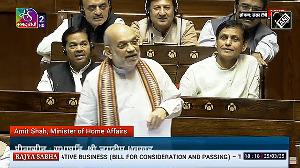'If an individual makes significant financial investments, she should stick to the old regime.'
'If the individual prefers straightforward computation without any tax benefits, the new regime would be suitable.'

When filing their income tax return (ITR), taxpayers can switch between the new and the old tax regime.
While salaried taxpayers are allowed greater flexibility in this regard, those with business and professional income have limited opportunities to shift.
"The new tax regime is automatically selected during the ITR filing process. If the taxpayer is dissatisfied with the new tax regime, they may submit Form 10IE to switch between the two tax regimes," says Adithya Reddy, an international tax lawyer.
Two regimes
The new tax regime was introduced from 2020-2021 and was subsequently made the default regime.
"Assessees have been given the option to calculate income, work out the tax liability, and after that opt for the tax regime that is beneficial to them," says chartered accountant Shashwat Singhal, proprietor, Shashwat Singhal and Co.
"The old tax regime provides substantial exemptions and deductions which, if availed, can reduce an individual's income tax liability. These exemptions and deductions are not available under the new tax regime," says S R Patnaik, partner (head-taxation), Cyril Amarchand Mangaldas.
Singhal informs that the tax rates are lower up to a certain income limit under the new tax regime.
Which works best
The new tax regime benefits people with incomes up to Rs 7 lakh. The breakeven point is where there is no difference in tax liability between the old and the new tax regime.
Experts have calculated breakeven points for different situations to help taxpayers decide which is more beneficial.
"If an individual has no deductions available under the old tax regime, the new tax regime is always more beneficial," says Naveen Wadhwa, vice-president, research and advisory at Taxmann..
"If a taxpayer uses only Section 80C deduction, the new tax regime is beneficial. If deductions are availed under sections 80C and 80D, the breakeven point is Rs 825,000," explains Wadhwa.
"Opt for the new tax regime if your income is above Rs 825,000," adds Wadhwa.
Taxpayers who avail of deductions under Section 80C, Section 80D, and Section 24 (interest on housing loans) should opt for the old tax regime.
"If an individual makes significant financial investments, she should stick to the old regime. If the individual prefers straightforward computation without any tax benefits, the new regime would be suitable," says Alay Razvi, partner, Accord Juris.
Points to remember
Individuals, Hindu Undivided Families (HUFs), Associations of Persons (AOPs) excluding cooperative societies, Bodies of Individuals (BOIs), or Artificial Juridical Persons with business or professional income are not granted annual flexibility to switch between the two tax regimes.
"Once they opt out of the new tax regime, they are allowed a single opportunity to transition to the new regime. Upon choosing to return to the new regime, they relinquish the option to revert to the old regime in subsequent periods," says Kumar.
"In contrast, individuals with non-business income may annually elect between the new and the old tax regime. The choice of the old tax regime must be made before the filing deadline stipulated under Section 139(1) of the Income-Tax (I-T) Act within the same fiscal year," adds Kumar.
Experts say the government wants all taxpayers to eventually switch to the new tax regime.
"It is simpler and does not require any paperwork to be collected or maintained by employers," says Patnaik.
The choice to switch to the old tax regime should be carefully made, especially by non-salaried individuals. Get professional help if you are unable to make the decision yourself.

Disclaimer: This article is meant for information purposes only. This article and information do not constitute a distribution, an endorsement, an investment advice, an offer to buy or sell or the solicitation of an offer to buy or sell any securities/schemes or any other financial products/investment products mentioned in this article to influence the opinion or behaviour of the investors/recipients.
Any use of the information/any investment and investment related decisions of the investors/recipients are at their sole discretion and risk. Any advice herein is made on a general basis and does not take into account the specific investment objectives of the specific person or group of persons. Opinions expressed herein are subject to change without notice.
Feature Presentation: Ashish Narsale/Rediff.com












 © 2025
© 2025